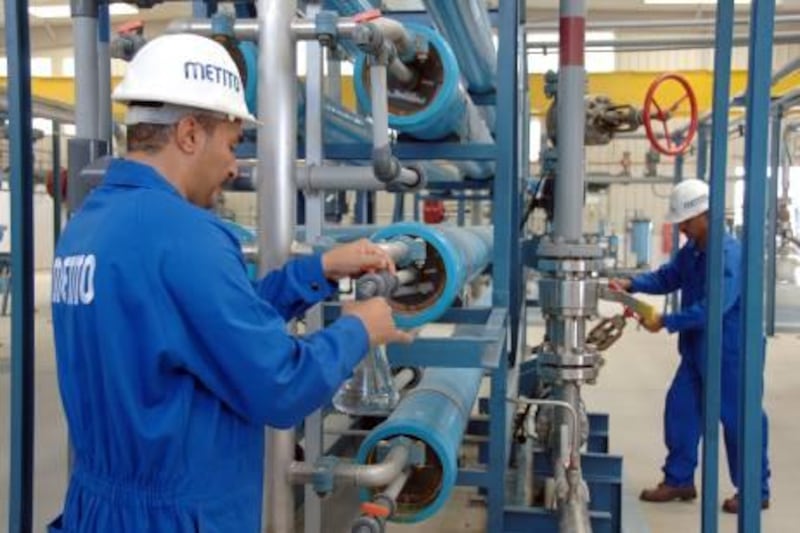DOHA // Within decades, solar-powered desalination plants will be the only way for the GCC to sustainably produce water, an expert said yesterday.
Current desalination systems are expensive and inefficient, and might last only another 30 years in the Gulf, said Dr Adil Bushnak, the chairman of Bushnak Group, a desalination company in Saudi Arabia.
"But after that we cannot continue the same way we are doing now," Dr Bushnak said on the sidelines of the 10th Gulf Water Conference, in Doha.
He proposes that GCC states use the money they saved by going solar to cover the cost of the transition.
"Every barrel of oil we save because we built solar should go to that fund to finance the extra cost of solar [plants]," Dr Bushnak said. "Wishful thinking is not enough. We have to set targets."
The UAE desalinates its water with non-solar methods, including thermal and reverse-osmosis (RO) desalination plants. But these require a lot of power from oil or from electricity, which is largely produced in oil-fired plants.
And although energy is cheap in the GCC, it might not stay that way.
In solar desalination, photovoltaic panels turn sunlight into energy.
The solar energy then powers groundwater pumps, and the water is forced through a membrane to remove the salt.
"We are building very inefficient desalination plants, which will be very expensive to maintain," said Dr Bushnak.
"They are inefficient in terms of energy and in terms of cost of water. Of course it is cheaper to build but not the cheapest water to produce."
And as the UAE is the world's third-biggest desalinator, after Saudi Arabia and the US, change is urgently needed.
"Just like Qatar did, we need to decide to move to solar desalination and I hope all the other [Gulf] countries follow," said Dr Bushnak.
Abu Dhabi has already started. Last January, the Environment Agency - Abu Dhabi announced it had completed 22 small-scale solar desalination plants and was planning eight more, each producing almost 11,000 cubic metres of water a year.
But that is a drop in the ocean compared with the emirate's total production of more than 1.7 million cu metres a day.
Metito, a Dubai water-treatment company, is also looking at building solar desalination plants.
Bassem Halabi, the company's group business development director, said that although solar energy was free hardware and maintenance costs had to be accounted for.
"The sandstorms and wind-blown dust [in] the region also limit the efficiency of the panels and, subsequently, the energy produced," said Mr Halabi.
And large-scale solar desalination is still a way off being commercially viable.
"It's too early for the technology to reach the level of production that's required today," said Dr Corrado Sommariva, the president of the International Desalination Association in Abu Dhabi.
"There are also no policies to encourage renewable and solar desalination to step up from the laboratory to the industrial scale."
And while the UAE has a lot of potential for renewable technology, "at the moment, they cannot compete both with traditional technology because the energy price is cheap in the Middle East and the capital expenditures are high", Dr Sommariva said.
But for Dr Bushnak, the issue cannot wait.
"We are drinking our oil instead of selling it so there will be less income to survive," he said. "We cannot afford it in 10 to 20 years, it will be more expensive."
Without action, he fears catastrophic consequences for the Gulf.
"We will be more thirsty, the economy will be in terrible shape and the society will not be stable," Dr Bushnak said.






